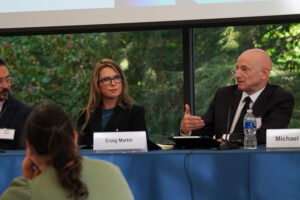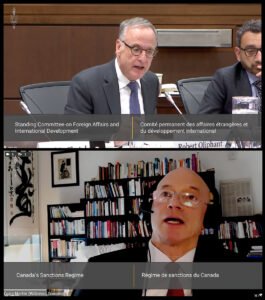 It was good to get JIB/JAB-The Laws of War Podcast back on-line after an almost 7 month hiatus! Started the new season with a fantastic new episode on the issues of sieges, the war crime of starvation, and the siege of Gaza, with Tom Dannenbaum of the Fletcher School of Law & Diplomacy at Tufts University. The podcast has now been listened to almost 44,000 times in over 120 countries, so it feels like it is worth continuing, notwithstanding how much work it is!
It was good to get JIB/JAB-The Laws of War Podcast back on-line after an almost 7 month hiatus! Started the new season with a fantastic new episode on the issues of sieges, the war crime of starvation, and the siege of Gaza, with Tom Dannenbaum of the Fletcher School of Law & Diplomacy at Tufts University. The podcast has now been listened to almost 44,000 times in over 120 countries, so it feels like it is worth continuing, notwithstanding how much work it is!
International Law
Speaking to the CBC on the Gaza Conflict
 I was pleased that the media is reaching out to international law scholars to get explanations of the legal issues raised by the conflict in Gaza, and was happy to speak with the CBC’s Canada Tonight show on the topic despite how fraught the issues are, but I found it difficult to provide the necessary nuance or really explain the complexity of any of these issues in the short time provided. It is pity that there is not sufficient time to lay out the issues in a little more depth and sophistication. Some other media, such as Ali Velshi’s spot on MSNBC, have taken a little more time with experts to explain some of these issues more fully. It is important for the public to understand these issues better.
I was pleased that the media is reaching out to international law scholars to get explanations of the legal issues raised by the conflict in Gaza, and was happy to speak with the CBC’s Canada Tonight show on the topic despite how fraught the issues are, but I found it difficult to provide the necessary nuance or really explain the complexity of any of these issues in the short time provided. It is pity that there is not sufficient time to lay out the issues in a little more depth and sophistication. Some other media, such as Ali Velshi’s spot on MSNBC, have taken a little more time with experts to explain some of these issues more fully. It is important for the public to understand these issues better.
Speaking on Rights-Based Climate Change Litigation at Case Western
 It was a pleasure to speak at the ABILA-sponsored conference, Climate Change and International Law at a Crossroads, at Case Western Reserve Univ. School of Law. I presented a paper on the significance of rights-based climate change litigation, on a panel that included Michael Kelly and Victoria Haneman of Creighton Univ. Law School, Alexander Pearl of Oklahoma Univ. Law School, and Rebecca Hamilton of American Univ. Law School. The panel discussion was great, and the rest of the conference was outstanding, with keynotes from Chile Eboe-Osuji of TMU Law School and former President of the I.C.C., and John Knox, former U.N. Special Rapporteur on Human Rights and the Environment.
It was a pleasure to speak at the ABILA-sponsored conference, Climate Change and International Law at a Crossroads, at Case Western Reserve Univ. School of Law. I presented a paper on the significance of rights-based climate change litigation, on a panel that included Michael Kelly and Victoria Haneman of Creighton Univ. Law School, Alexander Pearl of Oklahoma Univ. Law School, and Rebecca Hamilton of American Univ. Law School. The panel discussion was great, and the rest of the conference was outstanding, with keynotes from Chile Eboe-Osuji of TMU Law School and former President of the I.C.C., and John Knox, former U.N. Special Rapporteur on Human Rights and the Environment.
Testifying on Economic Sanctions in the House of Commons, Standing Committee on Foreign Affairs
 It was an honor to invited to testify before the Standing Committee on Foreign Affairs and International Development in the Parliament of Canada’s House of Commons, on September 27, 2023, on issues relating to Canada’s economic sanctions laws, but I confess that the format was less than ideal. With each member of the committee allotted as little as five minutes for a question and an answer, it was really impossible to delve into the complexities of the issues being addressed, which was a real shame. My testimony was based on my report for policy makers on Economic Sanctions Under International Law, which was published in 2021.
It was an honor to invited to testify before the Standing Committee on Foreign Affairs and International Development in the Parliament of Canada’s House of Commons, on September 27, 2023, on issues relating to Canada’s economic sanctions laws, but I confess that the format was less than ideal. With each member of the committee allotted as little as five minutes for a question and an answer, it was really impossible to delve into the complexities of the issues being addressed, which was a real shame. My testimony was based on my report for policy makers on Economic Sanctions Under International Law, which was published in 2021.
